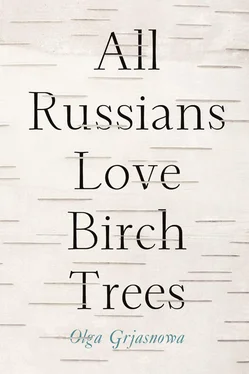I accompanied my parents to the immigration office and there learned that language meant power. If you didn’t speak any German you had no voice. And if you only spoke a little you went unheard. Applications were accepted and dismissed according to accent. We waited until my parents’ number came up on the monitor above the heavy iron door. The wait was usually very long. The immigration office rarely managed to process more than five migrants a day, and we had to stand in line hours before opening to have a chance at getting our turn before closing time. I also accompanied my mother to parent-teacher meetings — a thoroughly tormenting affair. I sat next to her in the hallway, sporting a bowl cut, substantial eyeglasses, and braces. I stared at my feet and took turns being embarrassed about my mother and myself. The German, math, and geography teachers announced unanimously that my language skills were subpar and that I was out of place at this high school. Impatiently I translated this for my mother. The high school that I attended knew immigrants solely from tabloid papers and afternoon TV shows. In my class there was a girl whose mother was from Finland and in my year a boy whose mother was Dutch, but neither of them wore clothes purchased at the discount store, and both were Mormons anyway. There were no Arabs, blacks, or Turks. I trudged behind my classmates, tried to acquire the same clothing style and hobbies, neither of which we could afford. When the class was too loud I was blamed, despite the fact that I was too ashamed to open my mouth. For three years I hardly spoke a word and instead focused on a vague idea of “later.” I wove dreams: studied maps, read travel guides, and made lists of things I would need on my travels. I was sure that everything would be better once I left and started living, as a photographer, journalist, or stewardess. Our small town had an American military base and sometimes I thought about marrying a soldier. But I didn’t find myself pretty enough and later I learned that the soldiers’ wives stayed in Germany. But I wanted to leave.
In the eleventh grade I had a German teacher who suffered from hair loss. Neither her colleagues nor her students forgave her for that. When she couldn’t take the humiliation any longer, she passed it on. It was a quiet, wan winter afternoon in the airless classroom. The German teacher also taught social studies and we were on the topic of immigrant delinquency. Everybody was in favor of immediate deportation of criminal aliens. Specifically, we were talking about the Mehmet case. Although I wouldn’t want to run into this Mehmet guy in a dark alley, I failed to grasp what set him apart from German criminals. He’d been born in Germany, raised in Munich, and attended only German public schools. The only difference was he didn’t have German citizenship. My teacher made sure to tell us exactly what was wrong with him.
When I couldn’t take the discussion any longer, I took my craft scissors out of my pencil case and approached the teacher. I stood facing her, scissors in my right hand. At that moment, I knew I could do anything I wanted. I tore the wig from her head. Somebody gave a loud laugh as her scalp was revealed, almost bald with only a few streaks of limp hair. She didn’t resist. Just looked at me, shocked. I pitied her, because — like me — she was a victim. But unlike her I’d decided to defend myself.
I was expelled. My mother was horrified, my father amused and a little bit proud. I knew that now everything would get better. At first I wanted to give up school altogether and instead go on a trip around the world, but I had neither the money nor a German passport. Therefore, I switched over to the Max Beckmann School in Frankfurt and moved in with Sibel. I was seventeen.
Now I spoke five languages fluently and a few others like white trash Germans speak German. But I didn’t have anything that resembled free time.
“What are you doing here?” Windmill asked.
“I’m visiting my boyfriend.”
He nodded and didn’t ask about Elias, which was all right by me.
“And you?” I asked.
“I’m going to give you my card. Let me know if I can help with anything.”
Even after Windmill had long finished his meal and left I still held his card in my hand.
The room was overheated and stuffy. Elias didn’t say a word and neither did I. Heinz had been released a couple of days ago and Rainer was being examined.
“I would cover it with a blanket if I could,” said Elias.
I pulled my knees to my chest and rested my head on them, a position in which I saw neither Elias nor his wound.
“Are you not going to look at me until I’m completely healed?”
“I just can’t look at your leg.”
“Why not?”
I paced the room. Elias followed me with his desperate, tired eyes. Still, at his core he was healthy, and I envied him this. He lowered his gaze.
“I don’t know how long I’ll be able to bear this,” he said.
“Are you breaking up with me?”
“I can’t help you.”
“Did I ask for your help?”
“Why don’t you finally tell me what happened to you? You didn’t emigrate until 1996. And by then, you didn’t really have to anymore.”
“Didn’t really have to anymore? What do you know?”
“Exactly. What do I know?” Elias repeated bitterly.
“You sound like the immigration office,” I said, interrupting him.
He took a deep breath and said, “It’s impossible to have a relationship like this.”
“So, that’s it? You’re breaking up with me?” I yelled.
“No!”
“Then none of this bullshit.”
I stormed out and slammed the door behind me. We had this conversation rather frequently and it got worse every time.
In the restroom I held my hands under the warm water. First the backs, then the wrists, until finally I held my head under the jet. Water dripped onto my feet. I thought about running away. It would take me two hours to pack and be out of the apartment. I could survive in most countries. Actually, now that I thought about it, I didn’t really need anything. I could just go.
I went back in. Elias smiled and reached out for me. I took a step closer to the bed. The sun died in the sky and flooded the room with warm light.
“There was a child and a father. The father wanted to bring the child to safety. It was a ten-minute walk to her grandmother’s apartment. The child wasn’t even seven years old and she felt that something had changed over the past few days, but couldn’t say what. That was what the child was thinking about when next to her a woman hit the asphalt. The pool of blood slowly reached the child’s shoes and the tips of the shoes soaked up the red. The blood was warm and the woman was younger than I am today. The child pushed back a strand of hair and a bit of blood remained on her cheek. It could have been worse, the grandmother said later that evening, as she cleaned the bloody crust off the child’s shoes.”
Elias took my hand in his, kissed my palm, and covered my arm with small kisses. Then he reached out for my face, stroked my cheek, and pulled me in close.
The sky was gloomy and commuters waited on the platform. Completely identical groups of students entered and exited. The S-Bahn stopped every two minutes. I couldn’t concentrate on my flash cards and instead observed the students. The boys were dressed in public housing fashion. The girls utilized their cellphone screens as mirrors and tried to fix their hairstyles. The gangsta peer group boasted with Turkish-Arabic pseudo-syntax. The underage ones bid their fellow students goodbye with “OK then … bunun üzerine , bye.” Fields, new buildings, and train stations now only appeared from time to time and they yelled at each other. “OK, like, bye!” Houses and people started to look like loaves of bread that had not fully risen. I was glad that my youth was over.
Читать дальше












